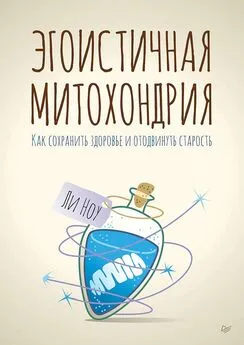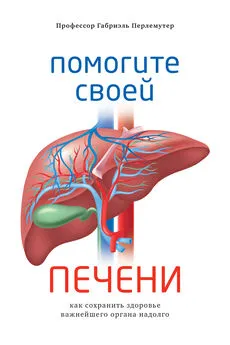Ли Ноу - Эгоистичная митохондрия. Как сохранить здоровье и отодвинуть старость
- Название:Эгоистичная митохондрия. Как сохранить здоровье и отодвинуть старость
- Автор:
- Жанр:
- Издательство:Питер
- Год:2020
- Город:Санкт-Петербург
- ISBN:978-5-4461-1021-6
- Рейтинг:
- Избранное:Добавить в избранное
-
Отзывы:
-
Ваша оценка:
Ли Ноу - Эгоистичная митохондрия. Как сохранить здоровье и отодвинуть старость краткое содержание
В нашем организме работают крошечные «энергетические станции» — митохондрии. Именно они отвечают за наше здоровье и отличное самочувствие. Когда они работают хорошо, мы не испытываем недостатка в энергии. А когда плохо — страдаем от заболеваний. Доктор Ли Ноу открывает тайну: заболевания, которые кажутся не связанными между собой на первый взгляд: диабет, рак, шизофрения, хроническая усталость, болезнь Паркинсона и другие — имеют общую природу.
Сегодня нам известно, как улучшить работу митохондрий, обеспечивающих организм энергией на 90 %. В этой книге вас ждет актуальная информация о питании, образе жизни, кетогенной диете и добавках, которые возвращают здоровье митохондриям, а следовательно, и нам.
Эгоистичная митохондрия. Как сохранить здоровье и отодвинуть старость - читать онлайн бесплатно ознакомительный отрывок
Интервал:
Закладка:
Brown M. S., inventor. Merck & Co., Inc., assignee. Coenzyme Q10 with HMG-CoA reductase inhibitors. United States patent US 4933165. 1989 Jan 18.
Caso G., et al. Effect of coenzyme Q10 on myopathic symptoms in patients treated with statins. Am J Cardiol. 2007 May 15; 99(10):1409–12. doi:10.1016/j.amjcard.2006.12.063.
Marcoff L., Thompson P. D. The role of coenzyme Q10 in statin-associated myopathy: a systematic review. J Am Coll Cardiol. 2007 Jun 12; 49(23):2231–7. doi:10.1016/j.jacc.2007.02.049.
Parker B. A., et al. Effect of statins on creatine kinase levels before and after a marathon run. Am J Cardiol. 2012 Jan 15; 109(2):282–7. doi:10.1016/j. amjcard.2011.08.045.
Tobert J. A., inventor. Merck & Co Inc., assignee. Coenzyme Q10 with HMG-CoA reductase inhibitors. United States patent US 4929437. 1990 May 29.
Akisu M., et al. Protective effect of dietary supplementation with L-arginine and L-carnitine on hypoxia/reoxygenation-induced necrotizing enterocolitis in young mice. Bio Neonate. 2002;81(4):260–5. doi:10.1159/000056757. Bahl J. J., Bressler R. The pharmacology of carnitine. Annu Rev Pharmacol Toxicol. 1987;27: 257–77. doi:10.1146/annurev.pa.27.040187.001353.
Binienda Z. K. Neuroprotective effects of L-carnitine in induced mitochondrial dysfunction. Ann NY Acad Sci. 2003 May; 993:289–95; discussion 345–9. doi:10.1111/j.1749–6632.2003.tb07536.
Brass E. P., Hoppel C. L. Relationship between acid-soluble carnitine and coenzyme A pools in vivo. Biochem J. 1980 Sep 15; 190(3):495–504. doi:10.1042/bj1900495.
Bremer J. Carnitine: metabolism and functions. Physiol Rev. 1983 Oct; 63(4):1420–80.
Ferrari R., et al. Therapeutic effects of L-carnitine and propionyl-L-carnitine on cardiovascular diseases: a review. Ann NY Acad Sci. 2004 Nov; 1033:79–91. doi:10.1196/annals.1320.007.
Geier D. A., Geier M. R. L-carnitine exposure and mitochondrial function in human neuronal cells. Neurochem Res. 2013 Nov; 38(11):2336–41. Epub 2013 Sep 5. doi:10.1007/s11064-013-1144-7.
Hagen T. M., et al. Acetyl-L-carnitine fed to old rats partially restores mitochondrial function and ambulatory activity. Proc Natl Acad Sci USA. 1998 Aug 4; 95(16):9562–6.
Hagen T. M., et al. Feeding acetyl-L-carnitine and lipoic acid to old rats significantly improves metabolic function while decreasing oxidative stress. Proc Natl Acad Sci U S A. 2002 Feb 19; 99(4):1870–5. doi:10.1073/ pnas.261708898.
Hoppel C. The role of carnitine in normal and altered fatty acid metabolism. Am J Kidney Dis. 2003 Apr; 41(4 Suppl 4):S4–12. doi:10.1016/ S0272-6386(03)00112-4.
Horne D. W., Broquist H. P. Role of lysine and e-N-trimethyllysine in carnitine biosynthesis. I: studies in Neurospora crassa. J Biol Chem. 1973; 248(6):2170–5.
Hulse J. D., Ellis S. R., Henderson L. M. Carnitine biosynthesis: beta-hydroxylation of trimethyllysine by an alpha-ketoglutarate-dependent mitochondrial dioxygenase. J Biol Chem. 1978 Mar 10; 253(5):1654–9.
Jacobs P. L., Goldstein E. R. Long-term glycine propionyl-l-carnitine supplemention and paradoxical effects on repeated anaerobic sprint performance. J Int Soc Sports Nutr. 2010 Oct 28; 7:35. doi:10.1186/1550-2783-7-35.
Kabaroglu C., et al. Effects of L-arginine and L-carnitine on hypoxia/ reoxygenation-induced intestinal injury. Pediatr Int. 2005 Feb; 47(1):10–4. doi:10.1111/j.1442-200x.2005.01999.x.
Kuratsune H., et al. Acylcarnitine deficiency in chronic fatigue syndrome. Clin Infect Dis. 1994 Jan; 18 Suppl 1:S. 62–7.
Lango R., et al. Propionyl-L-carnitine improves hemodynamics and metabolic markers of cardiac perfusion during coronary surgery in diabetic patients. Cardiovasc Drugs Ther. 2005 Aug; 19(4):267–75.
Liu J., et al. Memory loss in old rats is associated with brain mitochondrial decay and RNA/ DNA oxidation: partial reversal by feeding acetyl-L-carnitine and/or R-α-lipoic acid. Proc Natl Acad Sci U S A. 2002 Feb 19; 99(4):2356–61. doi:10.1073/pnas.261709299.
Lombard K. A., et al. Carnitine status of lactoovovegetarians and strict vegetarian adults and children. Am J Clin Nutr. 1989; 50(2):301–6.
McGarry J. D., Brown N. F. The mitochondrial carnitine palmitoyltransferase system. From concept to molecular analysis. Eur J Biochem. 1997 Feb 15; 244(1):1–14. doi:10.1111/j.1432–1033.1997.00001.
Montgomery S. A., Thal L. J, Amrein R. Meta-analysis of double blind randomized controlled clinical trials of acetyl-L-carnitine versus placebo in the treatment of mild cognitive impairment and mild Alzheimer’s disease. Int Clin Psychopharmacol. 2003 Mar; 18(2):61–71. doi:10.1097/01. yic.0000058280.28578.79.
Mortensen S. A., et al. The effect of coenzyme Q10 on morbidity and mortality in chronic heart failure: results from the Q-SYMBIO: a randomized double-blind trial. JACC Heart Fail. 2014 Dec; 2(6):641–9. doi:10.1016/j. jchf.2014.06.008.
Noland R. C., et al. Carnitine insufifciency caused by aging overnutrition compromises mitochondrial performance and metabolic control. J Biol Chem. 2009 Aug 21; 284(34): 22840–52. doi:10.1074/jbc.M109.032888.
Osmundsen H., Bremer J., Pedersen J. I. Metabolic aspects of peroxisomal betaoxidation. Biochim Biophys Acta. 1991 Sep 11; 1085(2):141–58. doi:10.1016/0005-2760(91)90089-Z.
Pande S. V. A mitochondrial carnitine acylcarnitine translocase system. Proc Natl Acad Sci U S A. 1975 Mar; 72(3):883–7.
Pande S. V., Parvin R. Carnitine-acylcarnitine translocase catalyzes an equilibrating unidirectional transport as well. J Biol Chem. 1980 Apr 10; 255(7):2994–3001.
Plioplys A. V., Plioplys S. Serum levels of carnitine in chronic fatigue syndrome: clinical correlates. Neuropsychobiology 1995; 32:132–8.
Pons R., De Vivo D. C. Primary and secondary carnitine deficiency syndromes. J Child Neurol. 1995 Nov 1; 10 Suppl 2:S8–24.
Ramsay R. R., Arduini A. The carnitine acyltransferases and their role in modulating acyl-CoA pools. Arch Biochem Biophys. 1993 May; 302(2):307–14. doi:10.1006/abbi.1993.1216.
Rebouche C. J. Kinetics, pharmacokinetics, and regulation of L-carnitine and acetyl-L-carnitine metabolism. Ann NY Acad Sci. 2004 Nov;1033:30–41. Rebouche C. J., Paulson D. J. Carnitine metabolism and function in humans. Annu Rev Nutr. 1986; 6:41–66.
Rebouche C. J., Paulson D. J. Carnitine function and requirements during the life cycle. FASEB J. 1992; 6 (15):3379–86. doi:10.1146/annurev. nu.06.070186.000353.
Reuter S. E., Evans A. M. Carnitine and acylcarnitines: pharmacokinetic, pharmacological and clinical aspects. Clin Pharmacokinet. 2012 Sep 1; 51(9):553–72. doi:10.2165/11633940-000000000-00000.
Sachan D. S., Broquist H. P. Synthesis of carnitine from epsilon-N-trimethyllysine in post mitochondrial fractions of Neurospora crassa. Biochem Biophys Res Commun. 1980 Sep 30; 96(2):870–5. doi:10.1016/0006-291X(80)91436-9.
Sachan D. S., Hoppel C. L. Carnitine biosynthesis. Hydroxylation of N-6-trimethyl-lysine to 3-hydroxy-N6-trimethyl-lysine. Biochem J. 1980 May 15; 188 (2):529–34. doi:10.1042/bj1880529.
Serati A. R., et al. L-carnitine treatment in patients with mild diastolic heart failure is associated with improvement in diastolic function and symptoms. Cardiology. 2010; 116(3):178–82. doi:10.1159/000318810.
Sinatra S. T. The Sinatra solution: metabolic cardiology. Laguna Beach, CA: Basic Health Publications, Inc; 2011.
Steiber A., Kerner J., Hoppel C. L. Carnitine: a nutritional, biosynthetic, and functional perspective. Mol Aspects Med. 2004 Oct — Dec; 25(5–6):455–73. doi:10.1016/j.mam.2004.06.006.
Tanphaichitr V., Broquist H. P. Role of lysine and e — N-trimethyllysine in carnitine biosynthesis. II: studies in the rat. J Biol Chem. 1973; 248(6):2176–81.
Vaz F. M., Wanders R. J. Carnitine biosynthesis in mammals. Biochem J. 2002 Feb 1; 361(Part 3): 417–29. doi:10.1042/bj3610417.
Virmani A., et al. The protective role of L-carnitine against neurotoxicity evoked by drug of abuse, methamphetamine, could be related to mitochondrial dysfunction. Ann NY Acad Sci. 2002 Jun;965:225–32. doi:10.1111/j.1749–6632.2002.tb04164.
Abbott R. D., et al. Dietary magnesium intake and the future risk of coronary heart disease (the Honolulu Heart Program). Am J Cardiol. 2003 Sep 15; 92(6):665–9. doi:10.1016/S0002 -9149(03)00819-1.
Alloui A., et al. Does Mg2+ deficiency induce a long-term sensitization of the central nociceptive pathways? Eur J Pharmacol. 2003 May 23; 469(l–3)65–9. doi:10.1016/S0014-2999 (03)01719-9.
Amighi J., et al. Low serum magnesium predicts neurological patients with advanced atherosclerosis. Stroke. 2004 Jan;35(1):22–7. doi:10.1161/01. STR.0000105928.95124.1F.
Demougeot C., et al. Effect of diets with different magnesium content in ischemic stroke rats. Neurosci Lett. 2004 May 13;362(1):17–20. doi:10.1016/j.neulet.2004.01.034.
Eray O., et al. Magnesium efifcacy in magnesium deficient and nondeficient patients with rapid ventricular response atrial fibrillation. Eur J Emerg Med. 2000 Dec; 7(4):287–90.
Fox C., Ramsoomair D., Carter C. Magnesium: its proven and potential clinical significance. South Med J. 2001 Dec; 94(12):1195–201.
Hagen T. M., et al. (R)-alpha-lipoic acid-supplemented old rats have improved mitochondrial function, decreased oxidative damage, and increased metabolic rate. FASEB J. 1999 Feb; 13(2):411–8.
Hagen T. M., et al. Mitochondrial decay in the aging rat heart: evidence for improvement by dietary supplementation with acetyl-L-carnitine and/or lipoic acid. Ann NY Acad Sci. 2002 Apr; 959:491–507. doi:10.1111/j.1749–6632.2002.tb02119.
Hans C. P., Chaudhary D. P., Bansal D. D. Magnesium deficiency increases oxidative stress in rats. Ind J Exp Biol. 2002 Nov; 40(11):1275–9.
Hans C. P., Chaudhary D. P., Bansal D. D. Effect of magnesium supplementation on oxidative stress in alloxanic diabetic rats. Magnes Res. 2003 Mar; l6(1):13–9.
Klevay L. M., Milne D. B. Low dietary magnesium increases supraventricular ectopy. Am J Clin Nutr. 2002 Mar; 75(3):550–4.
Kramer J. H., et al. Dietary magnesium intake influences circulating proinflammatory neuropeptide levels and loss of myocardial tolerance to postischemic stress. Exp Biol Med (Maywood). 2003 Jun; 228(6):665–73. Kubota T., et al. Mitochondria are intracellular magnesium stores: investigation by simultaneous fluorescent imagings in PC12 cells. Biochim Biophys Acta. 2005 May 15; 1744(1):19–28. Epub 2004 Nov 11. doi:10.1016/j. bbamcr.2004.10.013.
Laires M. J., Monteiro C. P., Bicho M. Role of cellular magnesium in health and human disease. Front Biosci. 2004 Jan; 9:262–76.
Lukaski H. C., Nielsen F. H. Dietary magnesium depletion affects metabolic responses during submaximal exercise in postmenopausal women. J Nutr. 2002 May; 132(5):930–5.
Maier J. A., et al. Low magnesium promotes endothelial cell dysfunction: implications for atherosclerosis, inflammation and thrombosis. Biochim Biophys Acta. 2004 May 24; 1689(l):13–21. doi:10.1016/j.bba-dis.2004.01.002.
Читать дальшеИнтервал:
Закладка:










